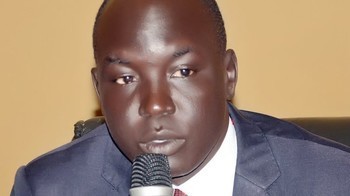Following the ongoing debate for and against the creation of 28 and later 32 States in South Sudan, the most unanswered question remains to be what are the contested issues? There are two contested issues: the legality or otherwise of the Presidential Order No 36/2015 for creation of 28 and later 32 States in South Sudan and the procedure of the National Legislature in the constitutional amendment creating 28 and later 32 States in South Sudan.
In letter and spirit of the constitution, there are only two ways to create states in South Sudan. One is the power of primary legislation vested in the Council of State under article 59 (a) which provides that the Council of State “shall initiate legislation on the decentralized system of government and other issues of interest to the states and pass such legislation with two-thirds majority of all representatives; and the second is the power of approval of the constitutional amendment by the National Legislature. The latter is done by way of introduction of the constitutional amendment by any organ of government.
To begin with the first question, the answer is that the President has power under the Transitional Constitution of the Republic of South Sudan 2011 as amended to initiate constitutional amendment. In the Presidential Order No 36/2015, many irrelevant provisions were cited, but only article 101 (f) of the Transitional Constitution of 2011 as amended authorize the President to “initiate constitutional amendments and legislation and assent to and sign into law bills passed by the National Legislature.
However, this power of initiation of constitutional amendment is conditioned by rules of procedure under conduct of business regulations of each house and article 199 of the Transitional Constitution which provide that “this constitution shall not be amended unless the proposed amendment is approved by two-thirds of all members of each House of the National Legislature sitting separately and only after introduction of the draft amendment at least one month prior to the deliberations”.
As a result, article 162 (1) of the Transitional Constitution provides that “the territory of South Sudan is composed of ten states governed on the basis of decentralization. This means that for creation of more states to happen in a constitutional manner, the proposed amendment of article 162 (1) would then be introduced to the National Legislature in accordance with provision of article 199 of the Transitional Constitution and if the constitutional amendment bill is passed, then the President shall sign it into law. So the answer to the first contested issue whether the Presidential Order No 36/2015 is legal or not only depends on whether the Presidential Order No 36/2015 is proposing an amendment to the Transitional Constitution or is it a self-standing and self-executing Order?
According to Presidential Order No 36/2015, Order 1 Paragraph 2 of the Order provides that this Order shall enter into force 30 days after the signature by the President. Accordingly, Order 10 paragraph 1 provides that this Order shall not be amended save by another Order by the President. Therefore, the legal effect of Order 1 and 10 of the Presidential Order No 36/2015 creating 28 States and later 32 states is that it is a self-standing and self-executing Order and not an amendment to the Transitional Constitution and therefore it is unconstitutional since the Presidential Order No 36/2015 is not and cannot be establishing instrument on its own for creation of 28 and later 32 States in South Sudan.
The answer to the second contested issue is very simple and strait forward, that the constitutional amendment bill which approved the creation of 28 is not the Presidential Order No 36/2015 since it is not an amendment proposal to the transitional constitution. Second, even if the National legislature, in ignorance of an express provision of Order 10 paragraph 1 of the Presidential Order No 36/2015, consider the Order as an amendment proposal, yet the constitutional amendment bill was approved with less quorum contrary to the provision of section 104 (l) of Conduct of Business Regulations 2013 of National Legislature, read together with article 199 of the Transitional Constitution.
According to attendance of the National Legislative Assembly, there were 332 members out of which 11 died and not replaced, and 24 joint armed oppositions. Therefore, the active membership of the National Legislative Assembly was 297 and the two-thirds of 297 is 198 members of parliament. During the debate, the attendance was 183 which is less by 15 votes to attain a quorum of 198 members of parliament to deliberate on the constitutional amendment bill. Therefore, the legal effect of this procedural irregularity is that the passed constitutional amendment is unconstitutional. The remedies of the two cases above are clear. It has to be resolved through a political process. But Let me stop from here.
Beny Gideon Mabor is South Sudan’s Human Rights Commissioner and this opinion article does not represent the position of any institution or government but solely the author.
The views expressed in ‘opinion’ articles published by Radio Tamazuj are solely those of the writer. The veracity of any claims made are the responsibility of the author, not Radio Tamazuj.




